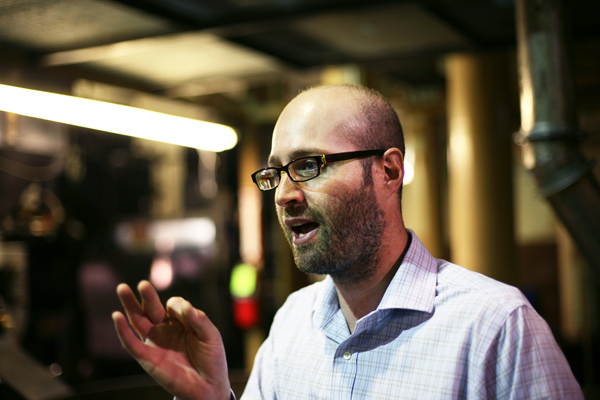Coffee roaster expands with two new brands
The funny thing about Empire Coffee Roasters in Port Chester is that 27 years after its founding and despite a current roasting load of 5 million pounds per year and employing 45 to 50 workers, you still couldn”™t get a cup of Empire coffee.
As of three months ago, however, that began to change with a move that vaults the company into the aromatic world of gourmet and super-gourmet coffees that it will produce and market in-house.
Empire launched its Waterfront Roasters division earlier this year and last week its Path Coffees division was born. The brands required months of research, roasting, grinding and “cupping,” the tea ceremony-like procedure in which different coffees are sipped from soup spoons and, as with wine tasting, analyzed for the broad quality of “balance,” which includes finer metrics such as acidity and fruitiness.
Waterfront Roaster coffee, according to Empire, “is all about wonderful gourmet coffee at very approachable prices.” A recent Waterfront batch featured 100 percent Arabica beans from the Kimel estate of New Guinea. Its markets so far include several restaurants and grocery stores. Waterfront is available ground, as a whole bean, or in foil pouches ”“ called fractionals ”“ used by coffee services.
Path Coffee Roasters is higher end for the likes of coffee shops or upscale restaurants. Path touts itself as “all about discovering the finest specialty coffees available.”
Path”™s Finca Potosi coffee, for example, is named for the farm in Colombia where the beans are grown. The Finca Potosi label informs the javaphile his or her coffee contains Caturra and Typica varietals; that it is grown at an elevation 100 meters either side of 1,550 meters in the Valle de Cauca region; and that it contains notes of cherry, cocoa and citrus. Path sale portions are more limited than Waterfront”™s: 5-pound whole bean bags or 12-ounce retail size.
Other new Path offerings include decaf and, soon, Ethiopian coffees. Each takes the better part of a month to develop: roasting, balancing acidities and factoring variables as disparate as temperature of the roast and temperature of the brewing water.
Roasting the microbatches that make Path and Waterfront coffees is a two-man job. Director of marketing Jason Richter and director of specialty coffee Johnny Steverson simultaneously run the machinery. “Johnny tells me what to do,” Richter said. “I just push the buttons. He watches the beans.” Richter is the son of company cofounder (and still active employee) Robert Richter.
Empire”™s Path and Waterfront coffees are roasted in a Dietrich Roaster, designed for small batches of 30-60 pounds of beans and tight controls. “We are constantly adjusting for things like gas, moisture and temperature,” Richter said. “Roasting is not something we take lightly.” Among the nuances: The coffee is still roasting when it comes from the roaster and that extra cooking time must be taken into account.
Empire”™s larger roasters can handle 500 pounds for its 50-some private coffee contractors across the decades who market, but do not roast, their own coffee. “They call and the next day we custom roast for them,” Richter said. “If we roast on Tuesday, it”™s out the door Wednesday. It”™s all computerized with an eye toward consistency.”
Whichever roaster is used, all beans are vacuumed from their cooling trays so that pebbles from the farm do not end up in the works. “A rock can really do some damage in a grinder,” Richter said.
Folks hew to their coffee traditions ”“ light and sweet to black ”“ and Richter said that is fine with Empire. But, he notes, “Specialty coffees are a different animal altogether. People have their individual standards. But I encourage them, at the very least, to get out of their comfort zone ”“ milk and sugar ”“ and see what happens. They will find there”™s a sweetness to specialty coffee.”
The company had distributed coffee and contracted roasting out of New Jersey. Its 40,000-square-foot warehouse at 110 Purdy Ave. dates to 1996. The equipment inside sparkles, including in the tasting lab where Lazy Susan-style tables whisk Severson”™s dark, hot potables to those seated across from him. “This one is a little different,” he said, discoursing on balance and the promise of blueberries while sliding a steaming cup into place at a recent cupping. “I think you”™ll like it.”
